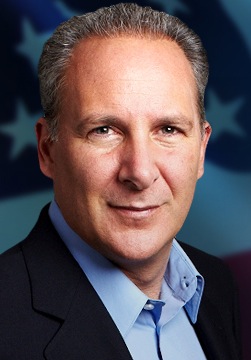Getting to the Core of Inflation Propaganda
Yesterday the Labor Department reported that July Consumer Prices rose by .5%. Today we were informed that July producer prices rose an even sharper 1%. Though these are very serious numbers, indicative of a chronic inflation problem, Government officials, Wall Street strategists, and the financial media tell us not to worry. Excluding energy prices, the so called "core" CPI rose a benign .1% and the "core" PPI a somewhat less benign .4%. Measuring inflation while excluding energy prices makes about as much sense as dieters weighing themselves while excluding all the fat around their stomach, hips and thighs. Just how did this ridiculous concept get started in the first place?/p>
Food and energy prices have historically been quite volatile, up big one month, down big the next. To prevent economists from jumping to erroneous conclusions the concept of the "core" CPI was developed. It has been argued that by looking at the monthly numbers without these volatile components, economists get a more accurate read on the true impact of inflation on consumer prices. Excluding food and energy in no way implied that such prices were not important components of the indexes, just that their prices tended to be more volatile, and hence less relevant on a monthly basis.
In 2002, when oil prices began their steady ascent from $20 per barrel, the common wisdom held that the rise was a temporary phenomenon based on global terrorism and the build up to the Iraq War. As a result, economists began ignoring the actual CPI in favor of the "core" as everyone knew that rising oil prices were a temporary phenomenon. Based on that false analysis, at least it made some sense to exclude rising oil prices, since the belief was that higher prices would ultimately be reversed. However today, with oil prices above $65 per barrel, and more economists having resigned themselves to the inevitability of even higher oil prices in the future, why is anybody still looking at the core?
Since 2002, oil prices have been anything but volatile. They have in fact been quite predictable, rising steadily for four years. In such an environment, excluding them when measuring inflation is a farce. Yesterday, CNBC showed a graphic which revealed the divergence between oil prices and the over-all CPI. Though historically the two have been highly correlated, recently they have diverged. CNBC's conclusion was that the U.S. economy was now so efficient that oil now has less influence on over-all consumer prices. Far simpler and credible an explanation is that either the data is being manipulated, or the lag between rising oil prices and rising consumer prices in general has lengthened.
In addition to being advised to ignore higher energy prices when computing inflation, we are also being told that higher oil prices will not "shock" the economy as oil is now so much less important to the economy today than it had been in the past. I have already pointed out why such claims are utter nonsense (See my commentary form March 9th "The U.S. Economy is as Vulnerable as Ever to an Oil Shock" on my web site at http://www.europac.net/archives.asp?year=2005&qtr=1# .) Interestingly, the analysts voicing these claims the loudest are the very people who told us that oil prices were not gong to rise in the first place. While it may be true that we do not directly consume as much oil as a percentage of our GDP as we did in the past, we indirectly consume even more, as oil prices are increasingly imbedded in import prices in general.
As oil prices continue to rise, and Asian currencies continue to appreciate, expect higher production and transportation costs to exert significant upward pressure on U.S. consumer prices for years to come. However, do not expect such price increases to show up in official CPI statistics, as the Labor Department has a tool called hedonic adjustments to fix that. Therefore, investors seeking legitimate inflation protection will not find it in Government issued "inflation protected" securities. As an alternative, consider building a portfolio of carefully selected, dividend paying, non-U.S. dollar denominated foreign equities. Don't let the fox guard your investment hen house. Down load my free research report "The Collapsing Dollar: The powerful Case for Investing in Foreign Equities" at www.researchreport1.com , and get some real inflation protection.
August 17, 2005
Peter D. Schiff
President/Chief Global Strategist
Euro Pacific Capital, Inc.

















